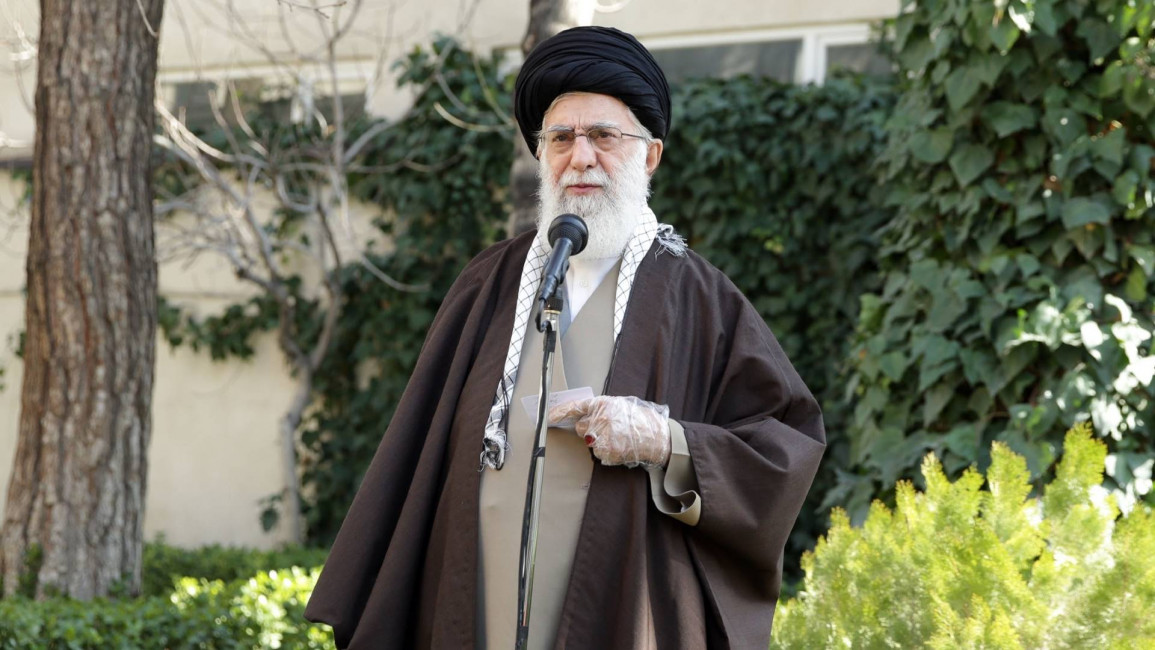Khamenei slams 'strange' US offer to help fight coronavirus while crippling sanctions remain
"Several times Americans have offered to help Iran to contain the virus. Aside from the fact that there are suspicions about this virus being created by America ... their offer is strange since they face shortages in their fight against the virus," said Khamenei in a televised speech.
"Iran has the capability to overcome any kind of crisis, including coronavirus outbreak."
Iran is battling the worst outbreak in the Middle East, with more than 20,000 confirmed cases, and has been widely criticised for its slow response.
As of Sunday, Iran's death toll stood at 13,069.
Iranian Foreign Minister Mohammad Javad Zarif took to Twitter on Tuesday to say that US sanctions were "impairing" Iran's ability to fight the COVID-19 disease.
The US withdrew from a landmark nuclear deal and began reimposing punishing sanctions on Iran in 2018, blocking banking transactions and oil sales, among other sectors.
Tensions have soured further since the US assassination of Iranian commander Qassem Soleimani in January.
On Saturday, Iranian President Hassan Rouhani said restrictions to fight the coronavirus outbreak will be imposed for only two to three weeks, by which time he expects the crisis to be under control.
Iran "has to do everything necessary to return economic production to normal," he said in comments broadcast on state TV and shared by Reuters.
Rouhani also accused "counter-revolutionaries" of plotting to adversely affect Iran's economic production. Iran's economy has been under strain since US President Donald Trump withdrew from the 2015 nuclear accord and imposed harsh new sanctions.
Twitter Post
|
Rouhani has defended his government's response to the pandemic in the face of widespread criticism that officials acted too slowly and may have even covered up initial cases before infections spread rapidly across the country.
He also sought to highlight what he viewed as the achievements of the past year, including the downing of a sophisticated US drone and missile strikes on US bases in Iraq in retaliation for the killing of Iran's top general in Baghdad.
Rouhani assured Iranians his administration will prioritise health in the coming year and said it had stockpiled basic supplies.
Khamenei issued a religious edict this week prohibiting all unnecessary travel and authorities have restricted travel between cities. After weeks of heavy criticism, authorities finally closed two major religious shrines in recent days.
Other countries in the region have imposed far stricter measures to contain the virus, including cancelling flights, sealing borders and forcing nonessential businesses to close.
Global pandemic
The COVID-19 virus, which was first detected in China's Wuhan in December, has killed more than 13,069 people worldwide, while over 308,595 infections have been confirmed.
The majority of those that infected with corona experience only mild or moderate symptoms, including fever and a dry cough.
However, concerns have been raised for the elderly and those with existing health issues, who have reportedly suffered with more severe complications, including pneumonia and even death.
The World Health Organisation this month estimated the novel coronavirus kills 3.4 percent of all those infected.
But for people aged over 80 the fatality rate was 21.9 percent, according to a report the WHO carried out with the Chinese authorities.
As of yet, there are no known treatments for the virus, though more than 95,829 have already recovered from the infection.
The World Health Organisation has confirmed those who experience a milder version of the virus recover in about two weeks, while those with more severe illness may take three to six weeks to recover.
As the pandemic continues to spread across the world, dozens of research groups around the world are racing to create a vaccine while governments continue to impose strict restrictions or "lockdowns" to help stem the spread of the virus.
Follow us on Facebook, Twitter and Instagram to stay connected



